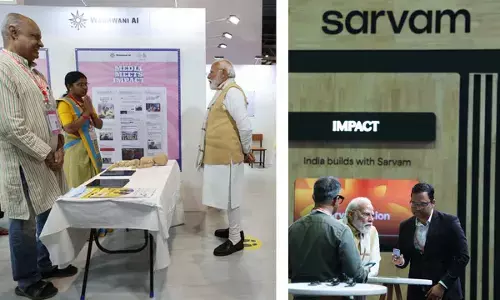ISRO develops microprocessor-controlled artificial knee

ISRO develops microprocessor-controlled artificial knee (Photo/IANS)
The Indian Space Research Organisation (ISRO) on Friday said it has developed a microprocessor-controlled knee (MPK) which is ten times cheaper against imported ones.
Chennai: The Indian Space Research Organisation (ISRO) on Friday said it has developed a microprocessor-controlled knee (MPK) which is ten times cheaper against imported ones.
According to the ISRO, the MPK will benefit above-knee amputees to walk with a comfortable gait.
With microprocessors, the artificial limb offers additional capabilities for the amputee than those offered by the passive limbs without microprocessors.
The space agency said the MPK has enabled an amputee to walk about 100 metre in a corridor with minimum support and efforts are underway to improvise the performance.
These smart MPKs are being developed by the Vikram Sarabhai Space Centre (VSSC), ISRO under an MoU with National Institute for Locomotor Disabilities (NILD), Pt. Deendayal Upadhyaya National Institute for Persons with Physical Disabilities (Divyangjan) (PDUNIPPD (D)), and the Artificial Limb Manufacturing Corporation of India (ALIMCO).
An MPK consists of a microprocessor, hydraulic damper, load and knee angle sensors, composite knee-case, Li-ion battery, electrical harness, and interface elements.
The microprocessor detects the state of gait based on the sensor data. The control software estimates the real-time damping needed to attain the desired gait by changing the stiffness of the system that is achieved by a hydraulic damper operated by a DC motor. Walking parameters specific to amputees can be set using PC-based software to improve one's comfort. The interface plots the parameters in real time during walking.
After testing the MPK with a normal person, the artificial limb was tested with an amputee, identified by NILD for conducting walking trials.
The trials were conducted at a NILD lab jointly by the NILD and the VSSC. The socket and fitment of MPK to amputee were realised by the NILD.
The VSSC tuned amputee-specific parameters. Initial walking trials were conducted with the support of parallel bars. Subsequently, the amputee could walk about 100 m in the corridor with minimum support. All the sub-systems of the knee performed satisfactorily.
According to ISRO, the MPKs currently available in India are imported and priced between Rs 10 lakh to Rs 60 lakh based on the complexity and functionality.
The ISRO MPKs, once commercialised, are expected to cost around Rs 4 lakh to Rs 5 lakh.
Optimisation of MPKs in terms of mass and envelope size is underway. More intelligence is being incorporated into the system to help the amputee walk through uneven terrains with advanced features for more comfort, ISRO said.
However, ISRO did not specify the timeline for coming out with the final product that would be commercialised.










